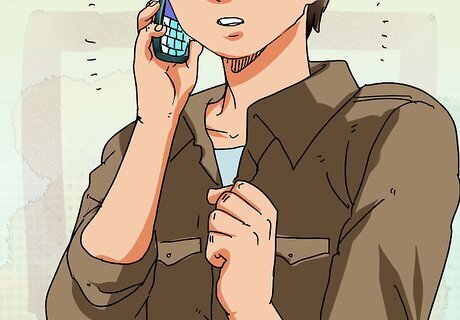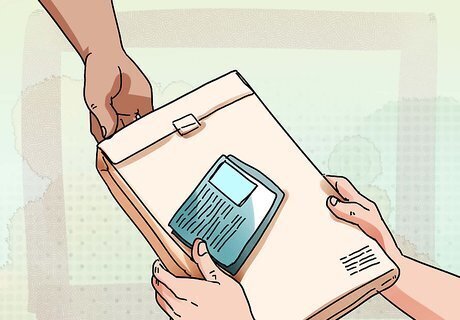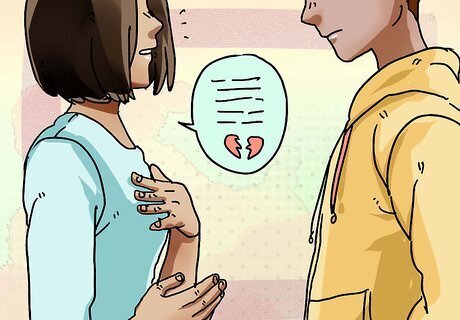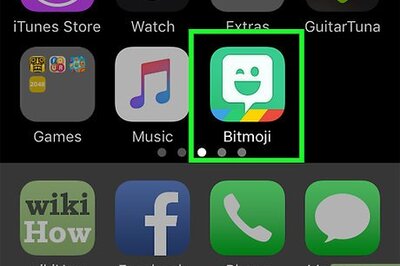
views
Breaking Up From a Distance

Consider breaking up with a phone call or a video chat, if you can't break up in person. It's important to express your feelings as personally as possible so that your partner can get the closure that they need. Avoid breaking with a text message or using online messaging. These forms of communication are much less personal than a phone call or a video chat, and your partner may not be able to get the closure that they need. If you've been with someone for a long time, it may seem callous and anti-climactic to break up over text. Avoid posting the breakup publicly on social media like Twitter or Facebook. This may come across as passive-aggressive, and your partner may retaliate publicly.

Tell your partner that you need to talk. Set a time and a medium for the conversation. This will prepare them for a serious conversation, and it will give you impetus to actually go through with the break-up. For example, send a message: "Are you around for a phone call this evening at eight? There's something that I need to talk to you about." If you have a regularly-scheduled "Skype date" or evening phone call, consider breaking the news during this time. "We need to talk" is near-universal code for "There's something wrong with this relationship." If you prime your partner with these words before the break-up conversation, they may go into the call with an inkling of what is to come. If you have been having trouble in your relationship for a while, they may even expect it.

Make the call and initiate the conversation. Get it over with. Say, "I hate to do this over the phone, but I need to say what I feel. This relationship isn't working for me, and I want to break up." Lay out your reasons for ending the relationship. Be gentle and kind, but do not compromise. Speak honestly and speak from the heart. For example: "I can't handle the distance any more. It's eating me up and splitting me apart inside. You're a wonderful person, and I hope that you find someone who can give you what you need--but I can't be that person." For example: "I don't see us winding up in the same city within the near future, and I don't want to keep pouring time and energy into something that isn't going anywhere."

Be firm. This is especially important when you aren't breaking up in person. Do not make the break-up sound like a deal or a suggestion. Be sure of your resolve and be clear in your intentions. Try to keep your explanation short and simple. The longer you linger, and the more you say, the more complicated the break-up may become. Words can tangle. Try to avoid an argument. Don't accuse your partner of anything, and don't lay blame. Explain that the break-up is about you and your inability to stay emotionally invested in this relationship.

Give your partner closure. Be patient and empathetic. Let your partner speak their side of the story, and listen. Stay on the line for as long as it takes to help your now-ex along the path to closure. Be aware that they may not find peace immediately, depending on how emotionally invested they are in the relationship. When there is nothing more to say: hang up. It's over.

Return any of your partner's possessions that you're holding. Consider mailing a box of things, or giving the items to a mutual friend to deliver. Tell your partner how you plan to return their things, and be sure to follow through. This is a kind gesture, and it may give your partner some peace of mind to know that they'll be getting their possessions back. Get this over with as soon as possible. This will help you both move on from the break-up. If you procrastinate, you will only feel worse about returning the things later on.
Breaking Up In Person

Consider breaking up with your partner face-to-face. It's generally best to break up in person, if you can, so that your partner can get the closure that they need. Show respect for the time and energy that you have both poured into this relationship. This can be one of the hardest parts about ending a long-distance relationship. You may feel obligated to break up in person, but you have trained yourself to make the most of your time together. These visits can become a sort of fantasy--a vacation from everyday life--and it is difficult to break the pattern. If you have plans to visit your partner soon, then take advantage of this visit. If you don't have anything planned, then consider going to visit them as soon as you can. You don't need to make up a reason, but it also may not be wise to inform your partner that you are coming to break up with them. Just go. If you are holding on to any of your partner's possessions--say, their sweater, or their favorite book--this is a perfect opportunity to return them. Bring these things with you when you go. Try to break up while you're visiting their town, rather than while they are visiting yours. This will make it easier for you to leave.

Avoid saving the break-up for a vacation or a long trip. The troubles of everyday relationship life may fade into the background of a vacation, and you may find it more difficult to initiate the break-up. Once you return to your daily life, you may find that the same frustrations rise to the surface one again. If you do break up with someone while on vacation, you may find yourself trapped in close proximity with an upset ex-partner for the duration of your stay.

Avoid making a scene. Try not to initiate the break-up in a public place with a high concentration of people, such as a restaurant, a coffee shop, or a bar. This may make the situation more intense. Make sure that you can easily leave the space after you complete the break-up. Try not to leave any of your possessions in your soon-to-be-ex's home, where it may be awkward to retrieve them. Consider initiating the break-up in a neutral, low-density public space, like a city park.

Initiate the conversation. Get it over with. Say, "We need to talk. This relationship isn't working for me, and I want to break up." Lay out your reasons for ending the relationship. Be gentle and kind, but do not compromise. Speak honestly and speak from the heart. For example: "I can't handle the distance any more. It's eating me up and splitting me apart inside. You're a wonderful person, and I hope that you find someone who can give you what you need--but I can't be that person." For example: "I don't see us winding up in the same city within the near future, and I don't want to keep pouring time and energy into something that isn't going anywhere. I wanted to do this in person, but this is it. It's over."

Be firm. Do not make the break-up sound like a deal or a suggestion. Be sure of your resolve and be clear in your intentions. Try to keep your explanation short and simple. The longer you linger, and the more you say, the more complicated the break-up may become. Words can tangle. Try to avoid an argument. Don't accuse your partner of anything, and don't lay blame. Explain that the break-up is about you and your inability to stay emotionally invested in this relationship.

Give your partner closure. Be patient and empathetic. Let your partner speak his or her side of the story, and listen. Stay for as long as it takes to help your now-ex along the path to closure. Be aware that they may not find peace immediately, depending on how emotionally invested they are in the relationship. When there is nothing more to say, or if you feel that the conversation has become circular: wish your ex-partner the best, and leave.
Disconnecting

Set clear boundaries. Avoid talking to your ex so often; resist the urge to contact or respond to them. Make it clear that the relationship is over, and make your intentions clear. If you interact with your partner primarily through technology--phone calls, text-messages, and the Internet--you will need to form new habits around these technologies. The relationship exists within the devices. If you "break up" with someone, but you still talk to them every day, you will remain emotionally invested. If you can maintain clear boundaries, feel free to do so--but be careful of letting a relationship linger on. Make sure that your ex understands this. If you are the one who initiates the break-up, your partner may remain emotionally attached to you. They may try to contact you again, and you should handle these feelings respectfully.

Give your ex-partner closure. They may feel the need to speak with you again after the break-up, whether it is to explain thoughts or air grievances. Do what feels right--but consider taking the time to speak with your ex. Be empathetic, but firm. Listen to your ex, and try to understand their point of view. Absorb what your ex has to say, but do not let it sway you. Remember why you initiated the break-up in the first place. If your ex happens to visit your area, and wants to meet up to talk--consider meeting, but be careful. If you fall back into your old relationship patterns for in-person communication, you may give your ex the wrong idea.

Move on with your life. Lay down your screens and go outside. Re-connect with your work and your friends. Appreciate your freedom. Try to meet new people. Join meetup groups, attend events, get involved in your community and build new connections. Use the break-up as a catalyst for other positive changes in your life. Do the things that you've always wanted to do. If you use the break-up as a time for personal growth, you may find it easier to move on, and you may face a lower risk of relapsing.

Try not to ruminate. Let the relationship end, even if the break-up is jagged. You are doing this for a reason. If you ever get nostalgic for your ex, remind yourself why you broke up with them. Consider keeping the list that you made of reasons to break up. If you begin to reconsider the relationship and grow wistful for the past, you can read over this list and renew your purpose.
Deciding to Break Up

Understand your feelings. Ask yourself why you want to break up with this person, and identify all of the things that make you unhappy in the relationship. Make a list of the things that bother you. Is the distance the problem, or is your partner the problem? Consider whether you can change any of these things, or whether they are simply immutable side-effects of a long-distance relationship. If you are undecided, make a list of positives and negatives: reasons to stay in the relationship, and reasons to leave it. Consider the weight of each point; one very powerful negative may negate a long list of positive aspects.

Make sure this is what you want to do. Consider whether you can resolve your frustrations by talking with your partner. If you are certain that you want to break up, then gather your resolve and make a plan. If you are tired of the distance, but you still love your partner, consider talking to them about the future. Long-distance relationships tend to work best when there is a light at the end of the tunnel: when you and your partner are planning to close the geographical distance in the near future.

Consider talking your feelings over with a friend. If you need to bounce your thoughts off of someone, but you aren't ready to speak with your significant other about the problems in your relationship, consider seeking the advice of a close friend, family member, or counselor. Lay out your grievances and explain why you are thinking about a break-up. Ask your confidante if your reasons are reasonable. He or she may validate your thoughts or help you see your situation in a new light. If your confidante has experienced a long-distance break-up themselves, it may benefit you to ask for their advice. They may be able to give you valuable tips.

Begin to move on with your life. Stop living under the shadow of a long-distance relationship. Open yourself up to the opportunities around you and consider what will make you truly happy. If you think that you want to break up with someone, giving yourself a taste of life on the single side will help you make your decision. If you begin to disconnect from your long-distance partner, and you like it, it may be the right choice for you. Try to meet new friends in your area. Consider joining a meetup group or attending free events around your city. Go exploring on your own, and don't think about the next time that you will speak with your partner. Do the things that your relationship has kept you from doing. Live for yourself and own every moment of your day. You may find that taking these steps actually gives you room to breathe in the relationship.

Make a clean break. If you've agreed upon an exclusive relationship, but you want to see other people, it may be best to break up with your partner before you move on in a romantic sense. Be respectful. If you cheat on a long-distance partner and they find out, they may be more likely to take the initiative and break up with you. However, the process may be exponentially more painful, and you will only prolong the situation. If you are considering a break-up because you are already romantically involved with another person: you will need to choose, sooner or later. The sooner you choose, the less painful it will be for everyone involved.




















Comments
0 comment